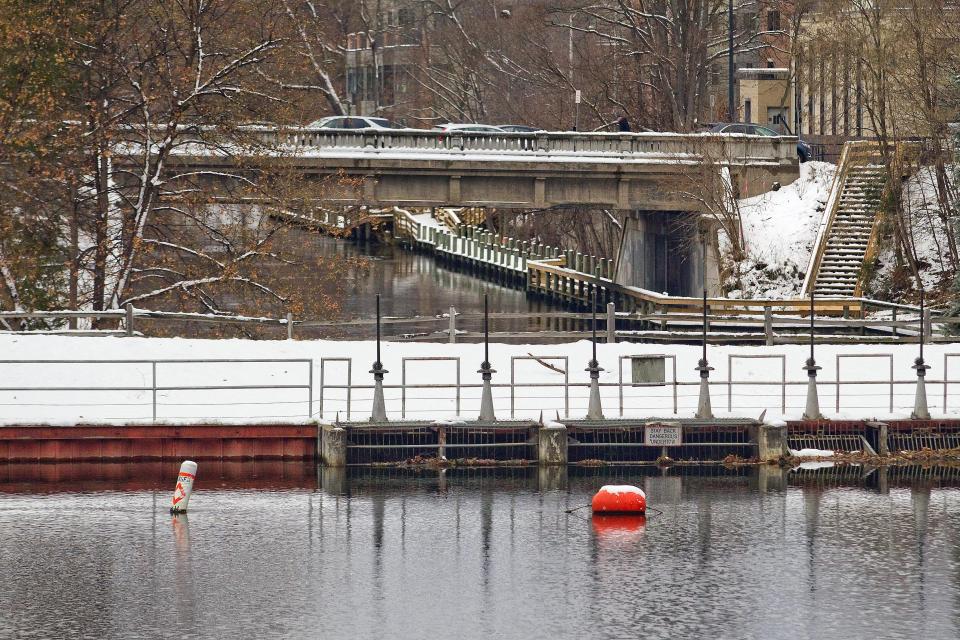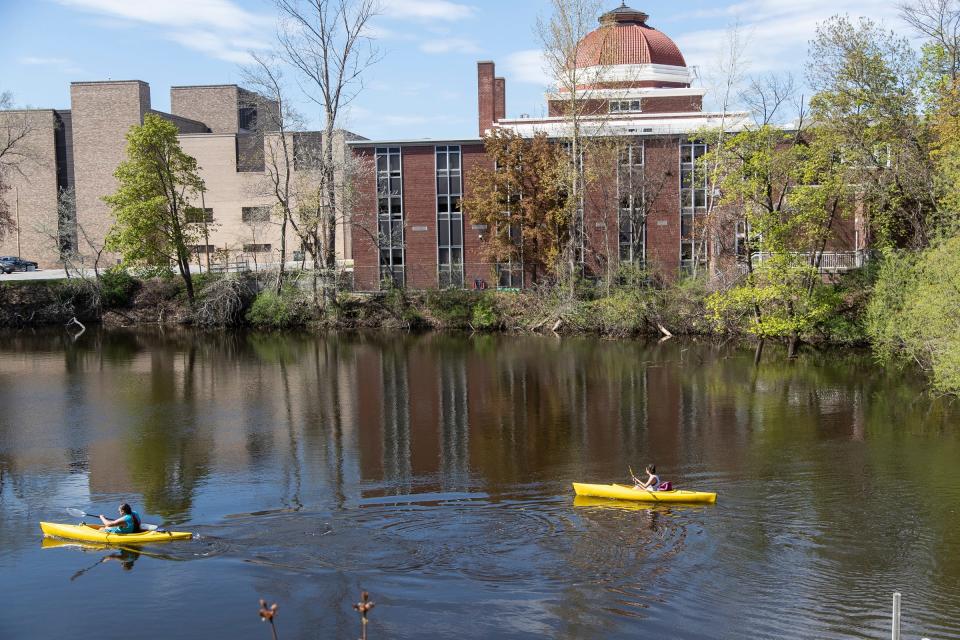Fish sorting research project in Traverse City goes to court of appeals in Petoskey
TRAVERSE CITY — A 20 year long restoration effort on the Boardman-Ottaway River in Traverse City is nearing completion, but a legal roadblock has delayed the effort.
The Boardman once had four dams, three of which have been removed to allow the river to flow freely. The Union Street Dam is the last dam on the Boardman, but the degrading structure cannot simply be removed.
The final dam is the furthest downstream and closest to Lake Michigan. It is the only thing standing between the Boardman and invasive species like sea lamprey, which would threaten the ecological health of the river. The dam also holds up the Boardman Lake.
Despite its important purpose, officials said the 100-year-old earthen dam is degrading and needs to be replaced before a dam failure causes serious damage. A required MDEQ Dam Safety Unit inspection deemed the dam to be in good to fair/poor condition.
A new dam will need to be constructed approximately a mile upstream from Lake Michigan before the Union Street Dam can be removed. Dam construction and removal is expensive, so Traverse City is working with the Great Lakes Fisheries Commission, U.S. Fish and Wildlife Service, the U.S. Army Corps of Engineers, the U.S. Geological Survey, the Michigan Department of Natural Resources, the Grand Traverse Band of Chippewa and Ottawa Indians and the Department of Fisheries and Oceans Canada to fund and build the FishPass project.

FishPass will replace the Union Street Dam with a new structure, as well as a research campus including an education and research center and recreation opportunities for kayaking and fishing.
The primary goal of FishPass is to identify methods of sorting fish through the dam. While the dam keeps unwanted creatures out of the river, it also keeps out the migrating fish that go to the river seeking cold water and spawning grounds.
The Union Dam’s step pool design only allows fish with the ability to jump to get through the structure, leaving several native species behind.
While fish passage is a global concern, officials said the research that will be conducted by FishPass is fairly unique and stands to benefit water bodies all over the world.
“FishPass is designed essentially to try to solve the connectivity conundrum facing barriers. The current trends globally are that more barriers are being installed than are being removed. And when you start considering barrier removal in the presence of invasive species, that's when you get into needing to have selective fish passage solutions. And that is not unique to the Great Lakes,” said Dan Zielinski, principal engineer and scientist with the Great Lakes Fisheries Commission and FishPass.
“The impact of invasive species and barriers is a global concern. And one that you know, in our conversations with international partners and colleagues, they're all looking at this project to see what solutions are going to be generated and are quite excited about the project as well.”
More:Maple River soon to be freed from aging dams, culverts and other infrastructure
More:U.S. Fish and Wildlife crews to survey Emmet County streams to find lampreys
The 10-year research project will look into a variety of methods for sorting fish. One method, Zielinski compared to machines that sort recycling by detecting density, size, shape, color and magnetism. The same concept applies to fish when also considering their migratory patterns.
However, different species of fish can have similar characteristics. Additionally, every species will have fish that are above or below average in size and weight. To address this, the research will include image recognition technology, similar to the facial recognition used to unlock smart phones.
According to Zielinski, image recognition has been used in fish studies before, but always in a laboratory setting where fish behaviors can differ from those in their natural habitat. FishPass will be the first to study this method in a natural setting.
Another method involves fish behavior, using environmental stimulation like bubbles, sound, light and pheromones to herd them through the structure. Fish will be sorted below the dam and transported up stream in a kind of elevator or archimedes screw, Zielinski said.
“We're not focusing on developing new tools, but it's really using the tools that have been developed over the past 50 to 100 years and being able to integrate multiple tools in different configurations. FishPass really presents the first time that that's ever been able to be done,” Zielinski said.

An important part of the FishPass project was the recreational and aesthetic appeal of the campus. Through direct interactions with community members, the commission incorporated features residents wanted into the design like natural aestheics, green space and rain gardens. They also did not include picnic tables or grills in the design, as requested by community members.
Marc Gaden, deputy executive secretary for the commission, said getting the community on board was essential for the project, since their support would determine whether the project was approved or not.
“We had kind of a dual need going on. That dam needed to be replaced because it's leaky and old and dangerous, frankly and we needed a place to do the technology and technique research in a very controlled setting. The results of FishPass would be the icing on the cake, the final piece of the puzzle for the Boardman-Ottaway River restoration,” Gaden said.
The commission has been holding meetings in Traverse City since 2016 and gauged that there is considerable interest in the project from residents. This was confirmed by Traverse City Attorney Lauren Triboe-Laucht.
In 2021, Traverse City resident Rick Buckhalter filed a case against the city and the commission on the grounds that the project was going to impact a public park and so should be put to a city-wide vote.
Judge Thomas Power of the Thirteenth Circuit Court in Grand Traverse County ruled against the city and said the issue should be voted on. The city appealed the decision with the support of Attorney General Dana Nessel and went in front of the Michigan Court of Appeals in Petoskey on Oct. 4.
Subscribe:Check out our offers and read the local news that matters to you
The decision will not be known for some time as the court considers the arguments, but Triboe-Laucht said her argument focused on three points. The first was that Section 127 of the city charter gives the city council the power to approve the project. She argued that this is also supported by the Michigan constitution, the Home Rule City Act and other statutory authorities.
Her other argument targeted Sections 126 and 128, which were the basis of the plaintiff’s argument. Both state that a vote is required when the city is looking to dispose of parkland, however, the property that would house the FishPass project is not dedicated parkland.
In addition to her point that the property is not parkland, Triboe-Laucht said the property is also not being disposed of. While the FishPass project is being funded and built with both state and private partners, the land will not transfer ownership. It will remain in the city’s possession throughout the entire process.
Funding for the project is already lined up, so if the court rules in favor of the city and commission, construction could start as early as spring 2023. With a two-year construction timeline, FishPass could be operating as soon as 2025.
“This is just the most innovative and most exciting project that I think I've seen our commission be involved in in a long time. Part of it is because it's truly paradigm shifting in terms of fisheries. But the other part is that it's the capstone of the restoration of the Boardman-Ottaway River that's been going on for a long time,” Gaden said.
“And being able to work with the people in that community from the city to the tribe, the DNR, the citizens (whose) enthusiasm for, not just this project, but the restoration of the river is just truly exciting. And it will just be a remarkable project once we have the chance to get it going. And we're looking forward to that.”
— Contact reporter Tess Ware at tware@petoskeynews.com. Follow her on Twitter, @Tess_Petoskey.
This article originally appeared on The Petoskey News-Review: FishPass in Traverse City goes to court of appeals in Petoskey

